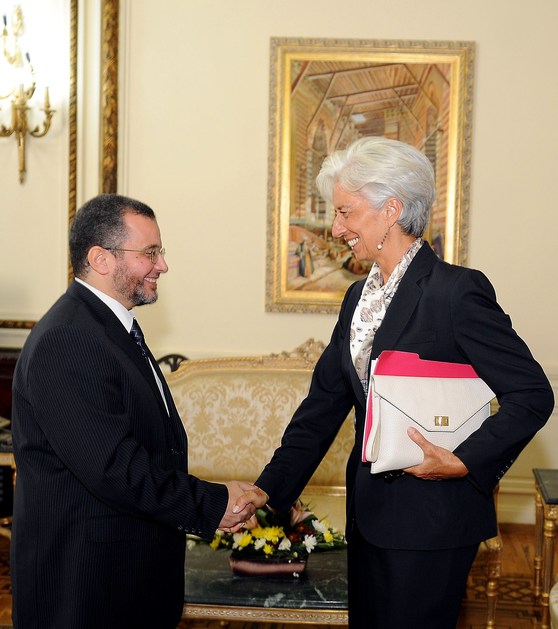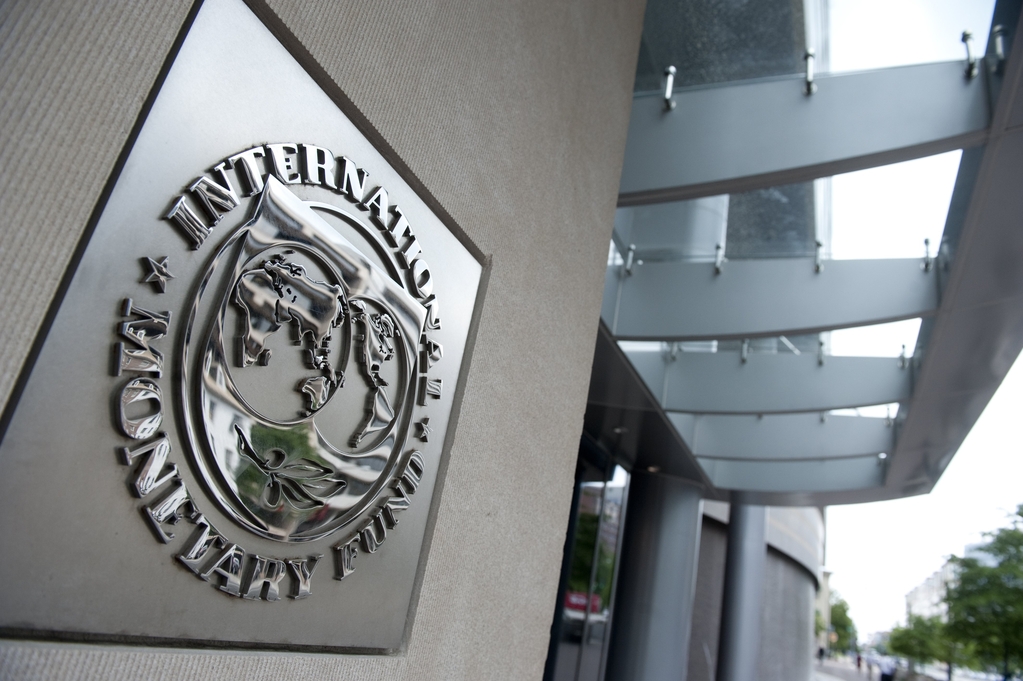Egypt, which has been eyeing a loan from the International Monetary Fund (IMF) for five years, is one step away from signing the deal during the IMF and World Bank biannual meetings next week.
Economic analysts and reports speculate the IMF deal is nearer after the Central Bank of Egypt (CBE) devalued the Egyptian pound on 14 March. Three days after the official devaluation, US-based financial services firm JP Morgan anticipated the Egyptian government will close the IMF loan before the end of the fiscal year.
International rating agency Fitch also believes Egypt can obtain the IMF loan it required, according to a recent report.
Since the start of the negotiations, Egypt has introduced “economic reforms”, in the government’s wording, to trim the growing budget deficit. Most notably, the government reduced fuel subsidies in July 2014, one month after President Abdel Fattah Al-Sisi took office.
The government cut fuel subsidies in the FY 2014/2015 budget by EGP 30bn causing a spike in inflation.
Egypt’s recent economic reforms have focused on reducing petroleum subsidies from EGP 134bn in the FY 2013/2014 budget to EGP 100.2bn in the 2014/2015 fiscal year budget.
Reduction in public revenues has prompted the government to increase the price of automotive petroleum products, such as gasoline, diesel, and kerosene in the domestic market, with the aim of trimming the budget deficit by EGP 48bn, equivalent to 10% of GDP.
Cairo’s government sees the IMF loan as a crucial remedy to its suffering economy as it will provide a direct influx of liquidity and will stem the country’s growing budget deficit. Cairo also hopes that the economic reforms it undertakes at the behest of the international lending agency will bolster investor confidence.
However, while Cairo increasingly has an eye on macroeconomic performance, the IMF deal will only exacerbate the austerity measures that come with such a focus. The direct effect of the government’s economic plan is the further deterioration of highly precarious welfare system.
An Egyptian delegation will attend the IMF and World Bank biannual meetings on 15 through 17 April. Minister of International Cooperation Sahar Nasr and Minister of Planning Ashraf El-Araby have said “all options are possible.”
In what follows, Daily News Egypt interrogates those possibilities to understand what will follow.

Photo courtesy of the Egyptian presidency
(AFP File Photo)
Egypt is ready to sign the deal: expert
The Egyptian government has applied several economic reform programmes to qualify to negotiate an IMF loan next week, economy professor at Cairo University Alia El-Mahdy said. Cairo is expected to continue this process and apply further reform measures in the new fiscal year.
Among the major economic measures, the government liberalised the foreign currency exchange rate, decreased energy subsidies, and intends to reform the civil service sector.
El-Mahdy voiced a concern over the country’s ban on the import of certain products: “We all understand that the IMF doesn’t support any state cap or limit on a certain process. The government barred the import of “non-essential products” in February and has newly-adopted methods to control imports with the aim of “protecting local industry”.
Earlier this year, the Ministry of Industry and Foreign Trade announced a list of imported products that would be banned unless the factories producing these items registered in the ministry’s General Organisation for Import and Export Control (GOIC).
Despite the move being said to target controlling the flow of foreign currency in Egypt during the dollar crunch, the Central Bank of Egypt (CBE) eased some of the burden last month by removing the monthly cap on dollar deposits and withdrawals for individuals.
El-Mahdy added that privatisation is also an important factor in the eyes of the IMF. The economist explained that the government’s plan to issue stocks of 30 public sector companies in the stock market is a proof that the government is considering privatisation.
As of yet, the government has explicitly announced the measures they plan to implement to secure IMF approval.
On 27 March, Prime Minister Sherif Ismail presented the government’s programme to the parliament for approval. Accordingly, the House of Representatives formed a committee to study the programme, which was approved on 11 April, according to the state-owned MENA news agency.
The terms of the economic programme have not been clearly announced and have been criticised by MPs for lacking a clear timetable.
IMF talks started in 2011
Egypt began discussing a potential loan with the IMF in 2011, after 25 January Revolution. However, political and economic turmoil at that time impaired Cairo’s eligibility.
After becoming Egypt’s first elected president after the 2011 uprising, former Islamist president Mohamed Morsi requested to increase an initially agreed upon $3.2bn loan to $4.8bn in 2012, citing a widening budget deficit and contracting levels of foreign currency reserves.
The proposed loan sparked public controversy. At the time, experts claimed Morsi was unable to meet the requirements set by the global lender.
In October 2012, Morsi’s government said it will begin applying “austerity measures to address the budget deficit” and reduce it to 9.5% in the upcoming fiscal year, to secure the loan.
These measures mainly included slashing fuel, agriculture, and food subsidies, raising indirect taxes on goods, and amending income and property tax laws.
At that time, Morsi’s government insisted that the controversial $4.8bn IMF loan would not harm the poor. However, public outcry broke out again when the government re-launched negotiations with the IMF in late 2012 and Morsi approved sweeping increases in sales taxes through the imposition of tax hikes on 25 goods as part of the deal with the IMF.
IMF reviews Egyptian market in post-Morsi era
The economic turmoil has continued after the downfall of the Morsi regime following nation-wide protests. But the influx of the $12bn assistance packages from Saudi Arabia, Kuwait, and the United Arab Emirates prompted the government to put the IMF talks on hold.
However, the IMF’s Chief of Mission in Egypt Christopher Jarvis stated, despite the aid packages the country obtained from Gulf countries, the country still needs financial assistance from the IMF or other Arab countries in order to achieve economic prosperity.
A year after Morsi’s withdrawal, the government started taking serious steps to secure the loan. Managing Director of the IMF Christine Lagarde visited Egypt in 2014 and positively commented on the economic status at that time.
Lagarde said that the steps taken by the government toward economic reform are a good start for “restoring public finances”. However, she did point to the need for a plan to protect the poor in light of subsidy reform through policies aimed at accelerating growth and creating jobs.
In the same year, Egypt’s government invited the IMF to assess the economic reforms before the country’s Economic Summit, based on Article 4 in IMF regulations. The article allows the IMF to evaluate the economic situation of nations and their budgets’ potential to serve public debts.
For the first time after the 25 January Revolution, the IMF mission visited Egypt in November to consult on Article 4 of IMF guidelines.
In the results of the review, Jarvis announced Egypt’s economy had begun to recover after four years of slow activity, adding that the upcoming period will present Egypt with an opportunity to capitalise on this potential.
In his review, Jarvis said that the Egyptian authorities have already begun to take action needed to achieve their objectives, including bold subsidy and tax reforms, a disciplined monetary policy, expanding social policies, and initiating wide-ranging regulatory and administrative reform efforts to improve the business environment and boost investment.
The IMF report stated that the local political uncertainties have affected tourism and capital flows, but the banking system has been resilient to the shocks and has maintained profitability, low non-performing loans, and high liquidity.
Moreover, in April 2015, Christine Lagarde sent a letter to Al-Sisi praising the economic reform measures taken by the government regarding economic legislations.
In her letter, Lagarde stated that the IMF is ready to support Egypt “in all possible ways”, according to a statement by the president’s office.

(AFP PHOTO / ERIC PIERMONT)
Where the deal currently stands
During the annual meetings of the IMF and World Bank last October in Lima, Minister of International Cooperation Sahar Nasr said Egypt had begun negotiations with the IMF for a $5.5bn loan to support the state budget.
With the deal being close to being signed, some analysts have expressed their concerns about the potential aftermath of the loan. Dalia Moussa, economic and labour rights expert in the Egyptian Centre for Economic and Social Rights (ECESR) commented that the IMF deal will not benefit ordinary people.
“I can’t see the economic reform that the government is talking about,” Moussa said.
According to Moussa, some files, which are more important than the IMF deal’s focus on macroeconomic policy, must be addressed by the government, including the EGP 1,200 minimum wage decision, which she said is not applied in all the public sectors.
Moussa also said the Value Added Tax (VAT), a factor that the IMF requires, will drive a wave of unprecedented price hikes.
The government has estimated it will collect EGP 35bn if it applies the VAT in fiscal year (FY) 2016/2017.
The IMF loan will only be positive if the government uses it to invest in development projects “to help people who were laid off from their jobs due to lack of cash and the economic recession in Egypt”, says Moussa.


